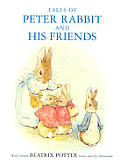When Fanfiction Took Over British Children’s Publishing
 The Horn Book just published Caroline Fraser’s excoriation of how Penguin has recently exploited Beatrix Potter’s Peter Rabbit with an aggressive copyright claim, broad product licensing, spin-off titles, and, most recently, commissioning sequels from actress and writer Emma Thompson.
The Horn Book just published Caroline Fraser’s excoriation of how Penguin has recently exploited Beatrix Potter’s Peter Rabbit with an aggressive copyright claim, broad product licensing, spin-off titles, and, most recently, commissioning sequels from actress and writer Emma Thompson.
British publishing seems to be crazy about such latter-day sequels lately. Such books have always been with us, of course, but the latest wave is distinguished by a couple of features:
- Many of the intellectual properties involved are still under copyright, meaning the new books were authorized or commissioned by the companies or trusts controlling those properties.
- The authors of those latter-day books aren’t work-for-hire hacks or even solid writers without a recent hit (like David Benedictus, author of Return to the Hundred Acre Wood) but well-known authors who could get reasonably well paid for their own original work.
Likewise, we have Carnegie Medal winner Geraldine McCaughrean writing an authorized sequel to Peter Pan, and competing in the marketplace with the not-originally-authorized American titles from Ridley Pearson and Dave Barry. Dame Jacqueline Wilson was commissioned to extend E. Nesbit’s Psammead trilogy. Former British poet laureate Andrew Motion penned a sequel to Treasure Island.
In other worlds, it appears the British children’s literature establishment has turned to fanfiction.


2 comments:
A number of years ago, sequels to the Narnia books were announced. I suppose nothing came of that.
It's been twelve years since the possibility of latter-day Narnia novels was up for discussion, and nothing seems to have come of it.
Of course, there’s another way to milk these properties for additional copyrights and dollars besides commissioning sequels. Publishers can also create abridged editions, board books, and other spin-offs that don’t claim to be continuations of the story in the same form. I think there have been Narnia titles of that sort.
Post a Comment